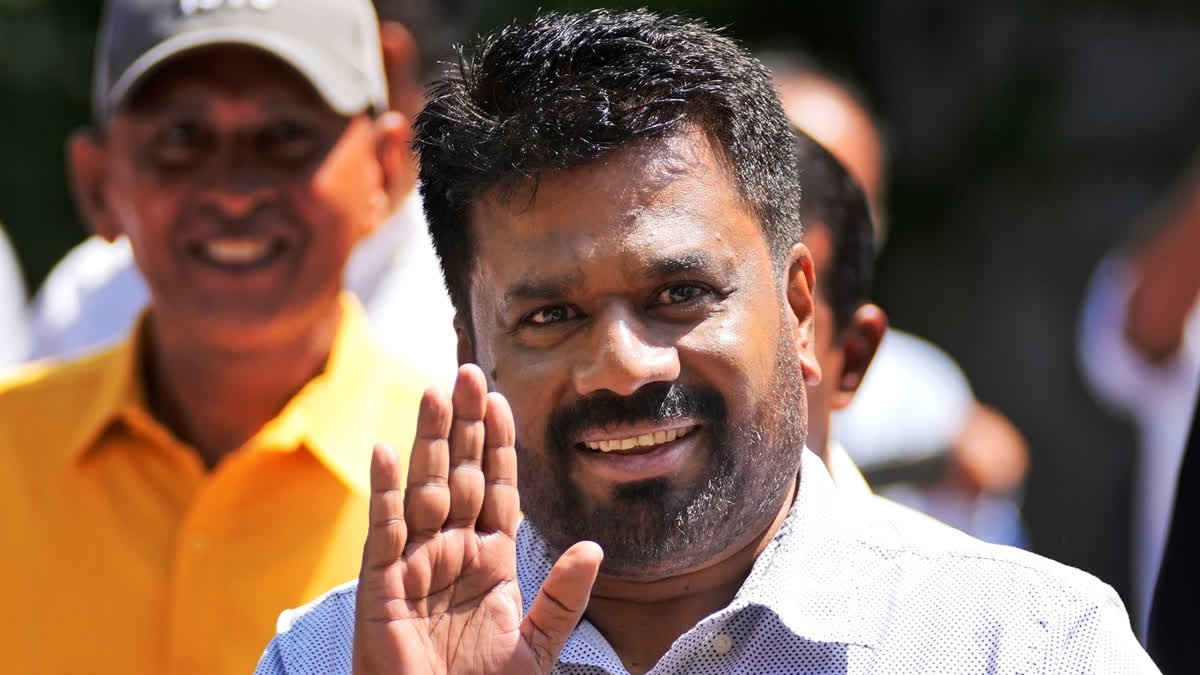Colombo: Marxist leader Anura Kumara Dissanayake on Sunday was declared winner of the Sri Lankan presidential election by the country's Election Commission after an unprecedented second round of counting of votes.
Dissanayake, 56, the leader of the Marxist Janatha Vimukthi Peramuna party's broader front National People's Power (NPP), defeated his closest rival Sajith Premadasa of Samagi Jana Balawegaya (SJB). Incumbent president Ranil Wickremesinghe was eliminated in the first round after he failed to become within the top two in the vote list.
NPP said Dissanayake will take oath on Monday. Earlier, the Election Commission ordered a second round of counting after no candidate secured over 50 per cent votes needed to be declared the winner of Saturday's election. Dissanayake will be the country's 9th president. No election in Sri Lanka has ever progressed to the second round of counting, as single candidates have always emerged as clear winners based on first-preference votes.
Dissanayake earlier got a seemingly unassailable lead of nearly 1.3 million votes over second-placed opposition leader Sajith Premadasa, who was trailing on 33 percent. Incumbent President Ranil Wickremesinghe -- who took office at the peak of the 2022 economic collapse and imposed tough austerity policies per the terms of an IMF bailout -- was a distant third with around 17 percent.
Sri Lanka has a preferential voting system, and a count of second choices marked on ballots will be conducted before a winner is formally declared. Wickremesinghe has yet to concede, but Foreign Minister Ali Sabry said it seemed clear that Dissanayake had won.
"Though I heavily campaigned for President Ranil Wickremesinghe, the people of Sri Lanka have made their decision, and I fully respect their mandate for Anura Kumara Dissanayake," Sabry said on social media.
Vijitha Herath, a lawmaker from Dissanayaka's party, said they were confident of victory but urged supporters to be patient as the count dragged on. "The Election Commission must complete the process of counting preference votes and that is what is delaying the final result," he said in a video message posted on the party's social media accounts.
IMF deal
Economic issues dominated the eight-week campaign, with widespread public anger over the hardships endured since the peak of the crisis two years ago. Dissanayake would "not tear up" the IMF deal but would seek to modify it, a party politburo member told AFP. "It is a binding document, but there is a provision to renegotiate," said Bimal Ratnayake.
He said Dissanayake had pledged to reduce income taxes that were doubled by Wickremesinghe and slash sales taxes on food and medicines. "We think we can get those reductions into the programme and continue with the four-year bailout programme," he said. Dissanayake's once-marginal Marxist party led two failed uprisings in the 1970s and 1980s that left more than 80,000 people dead.
It won less than four percent of the vote during the most recent parliamentary elections in 2020. But Sri Lanka's crisis has proven an opportunity for Dissanayake, who has seen a surge of support based on his pledge to change the island's "corrupt" political culture. "Our country needs a new political culture," he said after casting his ballot on Saturday.
Around 76 percent of Sri Lanka's 17.1 million eligible voters cast ballots in Saturday's poll. Dissanayake's party sought to reassure India that any administration he led would not be caught up in geopolitical rivalry between its northern neighbour and China, the country's largest lender.
New Delhi has expressed concerns over what it sees as Beijing's growing influence in Sri Lanka, which sits on vital shipping lanes criss-crossing the Indian Ocean. "Sri Lankan territory will not be used against any other nation," Ratnayake told AFP. "We are fully aware of the geopolitical situation in our region, but we will not participate."
Austerity rejected
Wickremesinghe sought re-election to continue belt-tightening measures that stabilised the economy and ended months of food, fuel and medicine shortages during Sri Lanka's economic meltdown.
His two years in office restored calm to the streets after civil unrest spurred by the downturn saw thousands storm the compound of his predecessor Gotabaya Rajapaksa, who then fled the country. But Wickremesinghe's tax hikes and other measures imposed under the $2.9 billion IMF bailout he secured last year left millions struggling to make ends meet.
Official data showed that Sri Lanka's poverty rate doubled to 25 percent between 2021 and 2022, adding more than 2.5 million people to those already living on less than $3.65 a day. Thousands of police were deployed to keep watch over voting on Saturday. A temporary curfew was imposed after polls closed, despite police reporting that there had been no violence during or after balloting. No victory rallies or celebrations are permitted until a week after the final results are declared.
Read More



